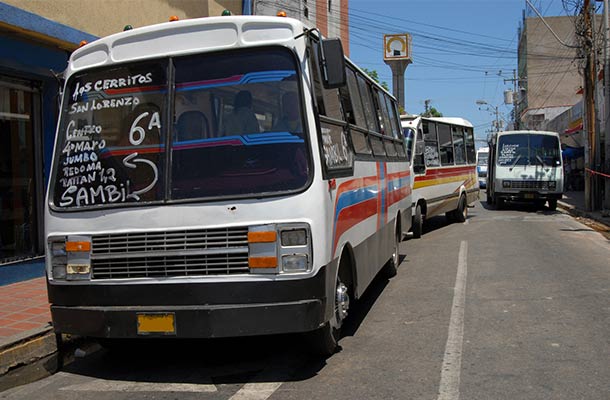Transport in Venezuela: Tips for Traveling Around Safely
Coronavirus (COVID-19) and travel: The situation around the world is changing dramatically. Various governments have changed their travel warnings to restrict travel during this time. To understand how this may impact cover under your policy, please go to our FAQs and select your country of residence.
For the latest travel warnings and alerts around the world, read about lockdowns and border restrictions.
Whether you're getting around Venezuela on planes, trains or cars, here are our travel safety expert's top tips on transport.
 Photo © Getty Images/grahamheywood
Photo © Getty Images/grahamheywood
While inexpensive bus service is available to most destinations throughout the country, the high incidence of criminal activity on public transportation makes bus travel inadvisable.
Overland travel
That leaves you with car travel. Driving regulations in Venezuela are similar to those in the rest of the developed world, although many drivers do not obey them.
Motorcyclists often weave in and out of lanes, and driving under the influence of alcohol is common, especially during weekends.
Many vehicles are in poor condition and drivers routinely ignore red lights, especially at night.
Clearly, defensive driving is a necessity.
Outside major cities, night driving can be dangerous because of unmarked road damage or repairs in progress, unlit vehicles, and livestock.
Even in urban areas, road damage is often marked by a pile of rocks or sticks left by passersby near or in the pothole or crevice, without flares or other devices to highlight the danger.
Importantly, travel to within 80 kilometers of the Colombian border is not advised due to terrorist and criminal activity. Kidnappings are common.
If you plan to cross into Colombia be sure to use official border crossings.
If traveling by taxi beware that incidents of taxi drivers in Caracas overcharging, robbing, and injuring passengers are common.
In a jam
Traffic jams are common within Caracas during most of the day and are frequently exploited by criminals. Armed motorcycle gangs often operate in traffic jams and tend to escape easily. Cases of armed robbery by motorcyclists and theft of other motorcycles have increased and may result in death if the victim does not comply.
Venezuelans themselves will be traveling in summer and winter school breaks and major civil and religious holidays, including Carnival, Easter, Christmas, and New Year's holidays.
Lengthy delays due to road congestion are common during these peak periods.
Dealing with police (fake and real)
Stops at National Guard and local police checkpoints are mandatory. Drivers should follow all National Guard instructions and be prepared to show vehicle and insurance papers and passports. Vehicles may be searched.
In the event of an accident, however badly traffic may be blocked, both vehicles must remain in the position of the accident until a Traffic Police Officer arrives. Insurance companies are unable to pay claims on vehicles that have been moved without a Traffic Police accident report.
Beware that well-armed criminal gangs operate widely, often setting up fake police checkpoints.
Cars have been forced off the La Guaira highway leading from Caracas to the Maquetia International Airport, and the "Regional del Centro" highway leading from Caracas to Maracay/Valencia, and the victims were robbed.
Travelers should be aware of chokepoints inside tunnels and avoid obstacles in the road.
The final cautionary word on car travel is this; there have been reports of attempts by the police and National Guard to extract money for spurious reasons. In such cases, you may consider asking for a written record giving the basis of the offense and also for the penalizing officer's details.
Flight frights
If you plan to fly your way out of trouble, don't be fooled, aircraft travel in Venezuela is also beset with problems.
However, visiting tourist destinations in Venezuela is often possible only by flying in light aircraft.
Safety standards are variable and there have been several significant accidents in recent years on the main tourist routes, including Los Roques and Merida - four with fatal consequences. In general, it is better to seek out established companies operating modern multi-engined aircraft.
Local and International travel agents should be able to advise on whether or not the airline has a good safety record.
Sea pirates
And if choosing to get around by boat remember incidents of piracy off the coast of Venezuela remain a concern, and foreigners are routinely targeted.
In the last decade foreigners traveling by boat have been killed, beaten and robbed in a number of frightful attacks.
Anchoring offshore is not considered safe. Marinas, including those in Puerto la Cruz and Margarita Island (Porlamar), provide only minimal security.
In addition to security concerns, yachters should be aware of registration and other required permits in order to anchor in Venezuelan marinas.
Furthermore, rules governing the sale of fuel to foreign sailors in Venezuela vary by state.
Get a travel insurance quote for Venezuela
You can buy at home or while traveling, and claim online from anywhere in the world. With 150+ adventure activities covered and 24/7 emergency assistance.
Simple and flexible travel insurance
You can buy at home or while traveling, and claim online from anywhere in the world. With 150+ adventure activities covered and 24/7 emergency assistance.
Get a quote
No Comments